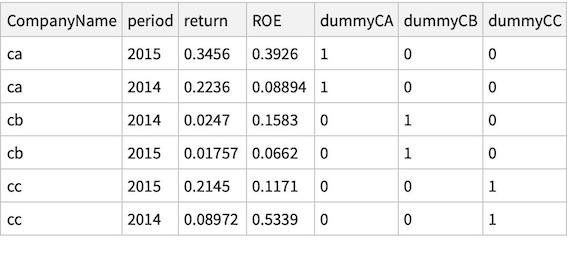I got a dataset that looks like the following example:
`exampleData = Dataset[{<|"CompanyName" -> "ca", "period" -> 2015,
"return" -> 0.3456, "ROE" -> 0.3926|>, <|"CompanyName" -> "ca",
"period" -> 2014, "return" -> 0.2236, "ROE" -> 0.08894|>, <|
"CompanyName" -> "cb", "period" -> 2014, "return" -> 0.0247,
"ROE" -> 0.1583|>, <|"CompanyName" -> "cb", "period" -> 2015,
"return" -> 0.01757, "ROE" -> 0.0662|>, <|"CompanyName" -> "cc",
"period" -> 2015, "return" -> 0.2145, "ROE" -> 0.1171|>, <|
"CompanyName" -> "cc", "period" -> 2014, "return" -> 0.08972,
"ROE" -> 0.5339|>}]`
What I am trying to do, is applying a function to the dataset that creates as many new columns as their are different values in CompanyName and at the same time fills it with the according dummies, in a way that the result looks like this:
exampleResult = Dataset[{<|"CompanyName" -> "ca", "period" -> 2015,
"return" -> 0.3456, "ROE" -> 0.3926, "dummyCA" -> 1,
"dummyCB" -> 0, "dummyCC" -> 0|>, <|"CompanyName" -> "ca",
"period" -> 2014, "return" -> 0.2236, "ROE" -> 0.08894,
"dummyCA" -> 1, "dummyCB" -> 0, "dummyCC" -> 0|>, <|
"CompanyName" -> "cb", "period" -> 2014, "return" -> 0.0247,
"ROE" -> 0.1583, "dummyCA" -> 0, "dummyCB" -> 1,
"dummyCC" -> 0|>, <|"CompanyName" -> "cb", "period" -> 2015,
"return" -> 0.01757, "ROE" -> 0.0662, "dummyCA" -> 0,
"dummyCB" -> 1, "dummyCC" -> 0|>, <|"CompanyName" -> "cc",
"period" -> 2015, "return" -> 0.2145, "ROE" -> 0.1171,
"dummyCA" -> 0, "dummyCB" -> 0, "dummyCC" -> 1|>, <|
"CompanyName" -> "cc", "period" -> 2014, "return" -> 0.08972,
"ROE" -> 0.5339, "dummyCA" -> 0, "dummyCB" -> 0,
"dummyCC" -> 1|>}]


